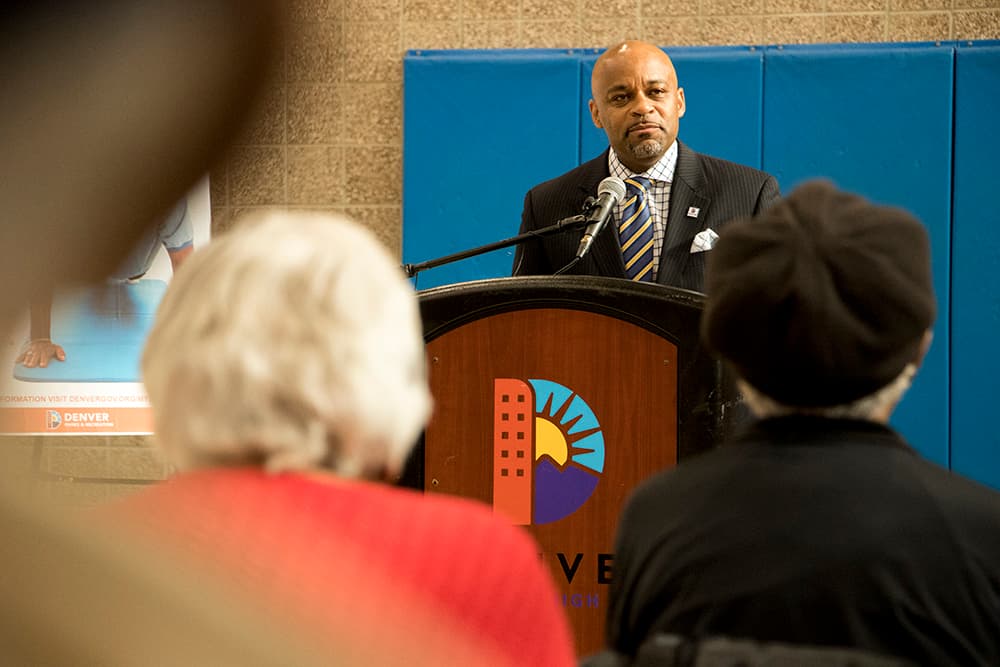Denver's elected leaders are "troubled" and "disappointed," but there's no sign that Mayor Michael Hancock will face any punishment or disciplinary process after admitting that he sent "inappropriate" text messages to a police officer in 2012.
Det. Leslie Branch-Wise, a former member of the mayor's security team, described Hancock's messages to her as sexual harassment. The texts said she was "sexy" and that Hancock's friends thought Branch-Wise was "fine," among other statements.
While allegations of unwanted sexual advances have led to discipline or firing of city employees, elected officials operate under different rules. Neither the Denver City Council nor the city's Board of Ethics have any distinct power to punish Hancock, officials said.
Instead, Councilman Kevin Flynn suggested, Hancock will face his judgment before voters in the 2019 election.
The mayor has apologized to Branch-Wise and to Denver residents. He said that he didn't make any sexual advances or inappropriate physical conduct. No one has alleged that Hancock violated criminal law.
"The Mayor holds himself accountable to this personal failure and is being open and transparent about this matter," wrote Amber Miller, a mayoral spokeswoman, in an email to Denverite.
Not applicable:
City rules forbid harassment by city employees. Punishment can include suspension without pay, demotion or dismissal. Previously, Hancock's administration fired one of his own aides in 2012 after Branch-Wise alleged that he had harassed her. (The exact content of the allegations is unknown, but she gave phone recordings as proof. The fired employee denied the allegations and won a settlement from the city.)
However, the city's employee discipline rules don't apply to Hancock and other elected officials. That's fairly typical in city governments.
Elected leaders are subject to the city's code of ethics, but that document doesn't contain the words "sexual harassment."
It's "quite clear that the Denver Code of Ethics does not address anything, anything, in the way of sexual misconduct or harassment or discrimination," said Michael Henry, executive director of the Denver Board of Ethics.
Councilman Flynn, who led a revamp of the ethics code, said that the code wasn't meant to cover issues of harassment. "That’s not an ethical issue. That’s a hostile workplace issue," he said.
Instead, the ethics code largely covers questions of the "public trust," such as corruption and conflicts of interest. Regardless, no one has yet filed any complaint that would allow the ethics board to investigate, Henry said.
Flynn acknowledged that the city council could use its investigative powers, including subpoena power, to look deeper into Hancock's conduct. Hancock would cooperate with any investigation, Miller said.
Even so, Flynn said, the council would have no authority to act on its findings. "It would end without the authority to do anything about it. We could do a report," he said.
"... The disciplinary process for the mayor is the next election."
Meanwhile, state lawmakers this week are considering whether to expel Rep. Steve Lebsock from the Colorado House of Representatives in light of sexual harassment allegations against him. City leaders don't have that power. (Lebsock was accused of unwanted touching and explicit requests for sex, according to The Denver Post.)
A new election?
Hancock is running for re-election in May 2019 and has no plans to resign early, he has said. If he did quit, the city would hold a special election to replace him -- a potentially costly endeavor.
"Whether you think he should or he shouldn’t, I try to be very practical," Flynn said. " ... We are so close to next May’s mayoral election (in 2019) that I think it would be not worth the $1 million to $1.2 million that the elections division told me this morning that it would cost."
Voters also could demand a recall election to remove an elected official like Hancock from office. It would take nearly 19,000 signatures to start the process under the Colorado Constitution, and the recall would then go to a public vote.
There is no indication that anyone has started that process or plans to do so.
Council reactions:
In a written statement, Council President Albus Brooks said that his "heart hurts for my city in this moment. My heart hurts for Detective Branch-Wise and the families this impacted."
He said that Hancock had "rightfully apologized," and that the administration was "taking the appropriate steps to learn from this lesson so it won't happen again."
He added that the "Denver City Council has no legal authority to take any action on behalf of this employee or against the Mayor."
Councilwoman At-large Robin Kniech also issued a statement.
"Sexual behavior in the workplace is disrespectful and disempowering to women, and it is totally unacceptable. Responsibility always lies with the boss to set high standards and to live by them, and I’m deeply troubled by the Mayor’s actions, the environment it created for Detective Branch-Wise and the consequences for our City," she wrote in an email.
"... It is up to us as leaders to make clear that sexual behavior in the workplace is unacceptable, and anyone experiencing it can and should speak up and seek help."
Councilwoman At-large Debbie Ortega said she was "disappointed" by Hancock's behavior but appreciated his apology.
"It is never appropriate to subject a woman or any person in the workplace to sexual comments, innuendo or harassment, especially when they are a subordinate," she said in a written release.
Denverite has requested comment from all other council members and will update if they respond.
Meanwhile, elected officials were informed today that the city was scheduling sexual harassment awareness and prevention training for them, Flynn said.












